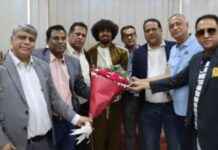Transformation Needed in Cadre Politics for Chhatra League: Insights from Hasnat
The recent incident of violence at Khulna University of Engineering and Technology (KUET) has sparked a conversation about the need for a transformation in cadre politics within student organizations. Hasnat Abdullah, a prominent figure in the anti-discrimination student movement, emphasized the importance of ensuring that student political groups like Chhatra League do not resort to oppressive tactics. He warned against the potential repercussions of engaging in power struggles, corruption, and manipulation, drawing parallels to the infamous regime of Saddam Inan.
During a gathering following a protest organized by the anti-discrimination student movement in Dhaka University, Hasnat addressed the crowd, stressing the collective responsibility of student organizations in upholding democratic values. He highlighted the sacrifices made by martyrs and urged students to align their actions with their principles if they choose to engage in politics. Hasnat acknowledged the historical context of student activism and emphasized the need to maintain integrity in the pursuit of political goals.
Upholding Democratic Values amidst Struggles
At the core of Hasnat’s message was a call to uphold democratic values and respect for human dignity in student politics. He urged students to remember the atrocities committed in the past and to learn from history to avoid repeating past mistakes. By emphasizing the importance of integrity and ethical conduct, Hasnat sought to inspire a new generation of student leaders who prioritize the well-being of their peers over personal gain.
Challenges and Opportunities in Student Politics
The recent clash at KUET and subsequent protests underscored the challenges and opportunities within student politics in Bangladesh. As tensions escalate between student groups, there is a growing need for dialogue, empathy, and collaboration to address underlying issues and prevent further violence. Hasnat’s call for a transformation in cadre politics reflects a broader desire for positive change and a rejection of the abusive power dynamics that have plagued student organizations in the past.
As the debate on the future of student politics continues, it is clear that the voices of young activists like Hasnat Abdullah will play a crucial role in shaping the narrative. By advocating for inclusivity, accountability, and transparency, Hasnat offers a compelling vision for a more just and equitable student movement. His words serve as a reminder that the path to meaningful change begins with a commitment to integrity and ethical leadership.
In conclusion, Hasnat Abdullah’s insights shed light on the complex dynamics of student politics in Bangladesh and the urgent need for transformation. As students grapple with issues of power, privilege, and accountability, his message resonates as a call to action for a new generation of leaders. By embracing democratic values and rejecting oppression, students can chart a path towards a more inclusive and equitable future for all.




















